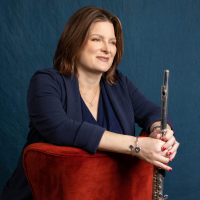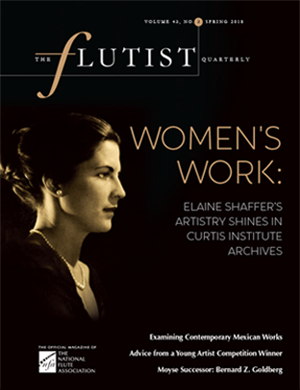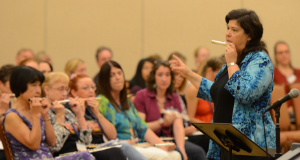News & Updates
Recent Blog Posts
Developing a Private Studio, Vol. 1: Finding your Why, (or Why Not?)
By: Charlene Romano
This blog post is the first in a four-part series on developing a private teaching studio.
As someone who has been managing a studio for decades, I am often asked the following pressing questions, by individuals looking to build their own private studios:
How many students do you have?
How did you get them?
How do you keep them?
While these are legitimate and good questions I will address later in this four-part series, I would like to start by addressing an even more important question:
Why do you want to teach privately?
What draws you, attracts you, to this way of making a living? We all know that in choosing to make a living making music, we are choosing not just a career, but a lifestyle. But there are many different ways to shape that career and lifestyle. And that’s one factor that draws many people to teach privately. You can make private teaching the most important part of your career portfolio, or you can make it a smaller part. You can hold a day job and still teach privately. You can be a primary caregiver for children or an adult and still teach privately. You can serve as an adjunct faculty member at an institution of higher education and teach privately. It’s obvious that flexibility is a perk of private teaching.
Compensation is also often mentioned as a perk. Depending on where you teach, you may bring in well over $100 per hour. (Please note the reality check of what I call “back end” studio work. Doing the books and invoicing students, maintaining communications, disseminating information, planning studio events, and maintaining a clean and functional studio space are just some of the tasks that are not covered in that hour. And if you perform, as most private teachers do, to the benefit of themselves and their students, you will need to set aside time to practice.)
While we’re on the reality-check side of things, please note there are no built-in health care benefits or 401k’s if you choose to start your own studio.
Which brings us back to the question of why.
I started teaching without knowing my why. I didn’t know I would love it as much as I do, and I didn’t know what I was doing. When I was a high school student, my first flute teacher, Christine Ertell of the Richmond (Virginia) Symphony, asked me to teach a handful of students who were either waitlisted for her, could not afford her rates, or were geographically closer to me. I fell in love with it. For me, it was deeply satisfying to watch a student absorb a new concept or skill, and incorporate it into their playing. Over the nearly four decades in which I have been teaching, my love of working with individual students has grown into something much deeper.
Primarily, I teach students in middle and high school, and for most students this is a fast phase of musical and artistic growth that will not be paralleled in their lifetimes. What an incredible opportunity it is to walk alongside these students and guide them as they find their voice. I particularly enjoy having a student from the very beginning, and mentoring them through their high school graduation. I’ve even had students graduate and return as adults for lessons!
For my adult students, the joy comes from watching them reconnect to their lost love, the flute, and find a new voice and a new place for music in their lives, or in introducing them to the flute for the first time. Anyone who has been to a convention will know that the adult amateur flute movement is thriving!
While it may seem that investigating our why is time-consuming and even frivolous, it is of great importance. For while a good teacher who knows their why can make a lasting impact on generations of students, a teacher who doesn’t know their why will be hampered in their efforts, and can even do great harm.
Be honest with yourself. It’s ok if your first motivating reason to take up private teaching is, “I need the extra money and I have the time and a place.” Just promise yourself you won’t stay in it if you don’t love it.
“I thought (private teaching) would be a better job than working at the mall or waiting tables, so I went for it. To my ETERNAL surprise, I loved it, everything about it, and I seemed to be good at it.” - Private studio teacher Jessica Dunnavant, DMA, Adjunct Artist/Teacher of Flute at Vanderbilt University Blair School of Music, Adjunct Professor of Flute at Lipscomb University
When I reached out on social media and asked musician friends who chose not to teach privately to share their why not, their reasons were varied and valid. They ranged from discomfort working with children and unmotivated students, to burnout, to lack of desire to engage in the non-musical aspects of running a studio, to a preference to work in a classroom setting, to scheduling challenges. It was very clear that my love of private teaching was not universal!
When I first started teaching, as much as I loved teaching kids, I did NOT like teaching adult students. Adult students asked lots of questions, almost faster than I could answer them, and as a new teacher, I wasn’t confident enough to give my students freedom.
I later learned that one could be one of three types of teacher: the one who stands at the bottom of the hill, yelling motivational strategies to the student as they climb; the one who stands at the top of the hill, the “sage on the stage,” expecting students to climb to them; or the one who walks beside the student, engaging their curious minds, reminding them to drop their elbows and breathe, challenging them within their reach, and guiding them to appropriate exercises and repertoire. Once I became that third kind of teacher, the one who walks the hill with my students, I felt comfortable teaching students of any age. I enjoy creating a welcoming space for students to come and explore and grow, as humans and as musicians. I learn from teaching my students, and it makes me a better musician and person too.
Recently, my doctor asked me if I had plans to retire in my 60s. (I am currently in my 50s.) While I can imagine slowing down, I see no reason ever to stop doing this job that I love, so long as I am of sound mind and body and able to do some good. But that’s my story. What is your own Why? Or Why Not?

Charlene Romano is past secretary of the NFA. She maintains active studios in Winchester and Richmond, Virginia. Romano has published several pedagogical articles and chapters, and has recorded on the Cantilena label. She performs with clarinetist husband John Romano as DuoRomano, and has served on the faculties of Shenandoah Conservatory, Solano College, and Sacramento State University’s Community Music Division. She held the title of Adjunct Associate Professor at Shenandoah Conservatory, where she taught applied lessons, coached ensembles, and taught music theory, aural skills, and developed and implemented a new applied musicianship curriculum. Her students are her biggest inspiration.
Community
Read updates from members and committees, post and view job and internship opportunities, and more.


Yuko Hoshi
The NFA, I believe, is an amazing hub of a worldwide flute community where members living outside the U.S., like myself, are given equal opportunities. I have met so many wonderful people from all over the world through the NFA. Come on and join us! Let’s play together!”
Membership With the NFA
Exclusive Member Benefits
- A subscription to The Flutist Quarterly.
- Discounts to SmartMusic Software, Principal Flute, and other partners.
- Unlimited access to Naxos Music Library and Grove Music Online.
.
Membership Options
The NFA welcomes students, student groups, libraries, and commercial members with special membership options.
"I am the NFA"
Our members make us who we are. Meet some of the members of the NFA and see why we inspire flutists and enrich lives.
Events
Browse performances, masterclasses, competitions, and more from the community.

Publications
The Flutist Quarterly
The Flutist Quarterly provides information and articles about the performance, study, history, manufacture, and enjoyment of flutes, flutists, and flute music.
FQ Plus
FQ Plus offers feature articles, interactive features, and news about flute events and people.
Committees

NFA Committees
Jobs & Internships

Donate To The NFA
Support the flute community
Your gifts helps ensure that the NFA continues to provide the highest level of service to its membership. Please consider making a tax-deductible gift to support the NFA’s operations and programs.
In celebration of “125 Years of Exquisite Flutemaking,” the Wm. S. Haynes Co. made a $125,000, 10-year commitment to the National Flute Association, for the years 2013-2022. This was recently extended to last until 2027. Learn more about it here.
